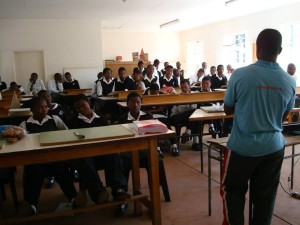For those of you reading this blog, my name is Jono and I’m currently waiting to start my first year as an Undergraduate at the University of St. Andrews for International Relations. During the break between school and university I have been lucky enough to acquire a role at Student Stop Aids Campaign, which I am hoping will push me on further through the journey of International Development. However, my interest in International Development initially was sparked upon visiting Swaziland in July 2013, where I discovered the reality of the challenges facing our generation, but also the great work that can be seen to be having a huge positive impact on the HIV/AIDS situation in poverty stricken communities worldwide.
Growing up within the concrete bubble of London, it was initially impossible to imagine life outside of it. To me, there was London, and this eerie unknown land called “The North”. However, after arriving in Mazini, Swaziland after a twelve hour round trip, it was difficult to imagine how I could go back to London. My first impressions of Swaziland were, as they would be for any Englishman, hot and sticky, but gorgeous beyond belief. The sheer expanse of green was almost too much for my urban brain, and I spent the journey to where I would be staying with my mouth firmly open.
Whilst I could write about the natural beauty of Swaziland for paragraphs and paragraphs however, the horrific reality of what seems like a perfect country was made all too real when the statistics were revealed to me. On studying the CIA World Factbook (2012 edition), the one figure that still shocks me today is that Swaziland, for a country that is less than 130Km across and 200Km in length, has the highest HIV/AIDS infection rate in the world, with more than 25% of the adult population carrying the virus. This high HIV prevalence is the result of a number of factors but strong social taboos around discussing sex and the presence of alternative ‘natural’ HIV medication has prevented people from getting the right information about HIV transmission, care and treatment. Despite this very real crisis however, the people of Swaziland have a unique community spirit which is felt throughout the entire country. One only has to look at the statistics to see that through the deep adversity Swaziland’s HIV/AIDS problem is decreasing. Currently, Swaziland is one of just five sub-Saharan African countries to achieve the target of getting more than 80 percent of eligible people on antiretroviral treatment (ART). In recent years, the number of people (aged 15-49 years) testing for HIV, and receiving their results, has rapidly increased; from 16 percent in 2009 to an estimated 40 percent in 2011. These incredible figures along with many others reveal that the work of NGOs, the government and Non-Profit Organisations is making a substantial difference. I was lucky enough to tour schools all over the country; engaging the kids in rugby training but also holding classroom sessions, in an attempt to mix the communal and positive outlet that a sport like rugby provides and the more serious aspects of the classroom sessions, which outlined thefacts about HIV and its contraction. However, despite its theoretically serious nature, in reality the classroom sessions which were run by the charity I was working for at the time (Skrum) were incredibly engaging and light hearted, and from the questions we were receiving at the end it was clear these kids were actually voicing their intrigue and confusion, meaning they could actually receive valid information on HIV/AIDS, instead of the false facts they were being fed on a daily basis. This is the striving towards the brighter future, which on initial inspection seems so bleak. The community of Swaziland (and I am in no doubt this extends towards the majority of Africa) is one that, even to an alien Londoner, is noticeable instantly. There is certain solidarity in the country, where they acknowledge the struggle towards an HIV/AIDS free community but they know it can be done, and although it is never directly spoken about, the community is definitely there. For someone who spends most of their lives on the London Underground where nobody says a word to each other, it was a real shock when everyone (and I mean everyone) is not only willing but searching for conversation.
I can say without a shadow of a doubt that my time in Swaziland was not only life changing, but it was eye opening to a world where the main problems of people’s lives are not that they have to get up to work early or their train is delayed by five minutes, but that there is a real risk of not seeing tomorrow. However, it also opened me up to the reality that the situation is improving, and it is testament to the people who spend their lives dedicated to ridding the world of the HIV/AIDS pandemic despite the numerous obstacles they face. My journey into this form of International development has only really just begun, but as I write this from the Restless Development offices in London, I can see people who have spent years on making an HIV free world more than just an idea, and after witnessing the brilliant work in Swaziland, I can see that their commitment is turning that idea into a reality.
